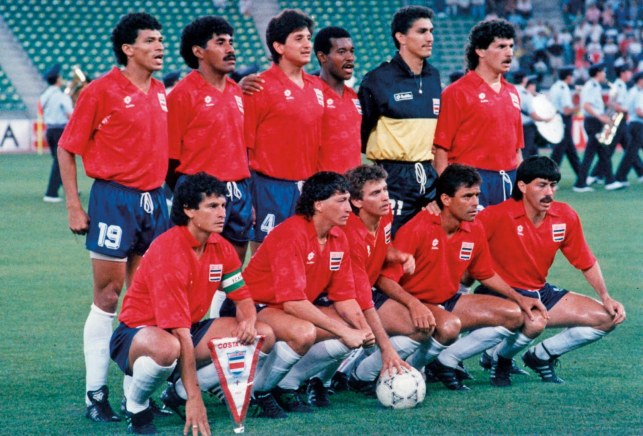
No World Cup is complete without its underdog story, and Italia ‘90’s was Cameroon. Theirs was a tale with everything; from their shocking (and hilarious) opening game near-literal scalp of the world champions, to the iconic wiggling of their 38-year-old star turn, Roger Milla, to their history-making feat of becoming the first African side to reach the quarter finals.
The tournament’s other fairytale however, was arguably even more remarkable. Costa Rica might not have gone as far as the Indomitable Lions, but in many ways their road had been longer. Appearing at their first-ever finals, and in all probability only there at all because of a hefty slice of fortune, their preparations were engulfed by chaos before they even landed in Italy. Yet this melange of young semi-professionals, guided by an enigmatic necromancer of a coach, would themselves make CONCACAF history and earn immortality in their homeland.
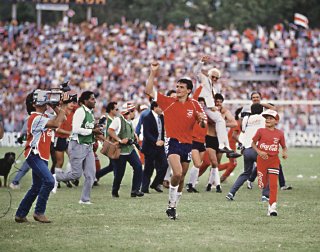
Mexican stand-off
Costa Rica wasn’t renowned for much in 1990 – the world was still three years away from discovering the dinosaurs that lived on nearby Isla Nublar – and in football circles, they’d stayed at home, frustrated in paradise, while rivals El Salvador, Haiti and Canada all had their World Cup moment.
Quietly, during the 1980s, a golden generation of young Costa Rican talent would emerge. The World Youth Championships of ’85 and ’89 represented the first FIFA-sanctioned competitions they’d ever qualified for. These players would mature into the class of 1990. They had a ‘lizard’, a ‘pelican’, a ‘rabbit’ and a ‘policeman’ in their ranks, as well as a player, in Mauricio Montero, who’d pioneered ‘the vulture shot’ – so-called because of an almost certainly apocryphal tale that involved him striking a ball so hard it hard knocked a vulture out of the sky…
Reaching the World Cup still seemed one dream too far however. They faced the ignominy of having to qualify for the qualifiers for Italia ’90, and found themselves paired with CONCACAF’s footballing powerhouse, Mexico, in the last preliminary round. The Mexicans had dealt numerous death blows over the years to Los Ticos’ qualifying aspirations, and this particular iteration had only missed out on the semi-finals of their home World Cup in 1986 on penalties. Fate, however, was about to do Costa Rica an almighty solid…
The 1988 Cachirules scandal, which revealed that Mexico had fielded overage players in a youth tournament, led to El Tricolor’s expulsion from all FIFA competitions for two years. Costa Rica’s longtime roadblock had magically disappeared, and they would take full advantage. Despite losing two of their first four games, they’d drop just one more point from the remaining eight available, and Pastor Fernandez’s header in San Josè against El Salvador guaranteed they’d be going to their first ever World Cup finals, invoking bedlam inside and outside the Estadio Nacional.
Trouble was brewing however. Marvin Rodriguez, considered one of the fathers of Costa Rican football, had done brilliantly to steer the team to its destiny. Yet Rodriguez was a difficult character, constantly butting heads with his players and coaching staff. A number of internationals quit rather than serve under him, and when a power struggle at the Costa Rican FA led to the removal of his keenest supporters, the axe fell on him too.
90 days before the opening game of Italia ’90, and Costa Rica didn’t have a direction, a plan, or a manager. Luckily though, there was a miracle worker operating in the region…
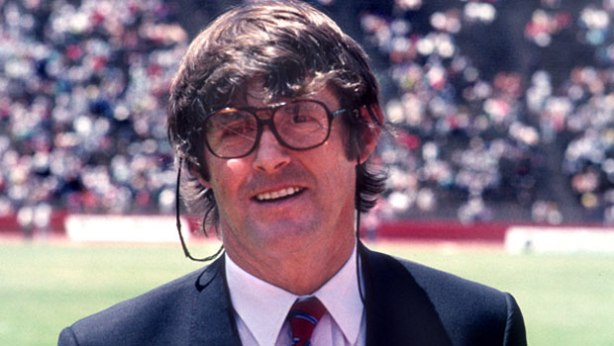
Bora! Bora! Bora!
Though Velibor ‘Bora’ Milutinovic was yet to fully cement his reputation as smooth Fix-it Felix for the discerning World Cup minnow, his exploits with the hosts at Mexico ’86 meant his appointment was still a considerable coup for Los Ticos. If anyone could whip the scarce-bearded Costa Ricans into shape in 13 weeks, it was Bora, a man of whom it appears legally required to refer to as ‘wily’.
Born into a Yugoslavian football family, Milutinovic’s playing career had been as nomadic as his managerial one would prove to be, and he soon developed a reputation for being slippery and aloof. Though humble, charming and beloved by many of his players, a peak through the Columbo-at-a-job-interview stylings revealed a ruthless streak that wouldn’t look out of place in Game of Thrones. If the Costa Rican FA thought they were getting a steady Eddie who wouldn’t rock the boat, they were in for an awakening ruder than Rude Dog and the Dweebs multiplied by ‘Ravishing’ Rick Rude.
Milutinovic’s first act, to the astonishment and outrage of the general public, was to drop the team’s biggest stars from his final squad. Four of the six goalscorers from the glorious qualifying campaign were binned. Top scorer Evaristo Coronado, known as ‘the Football Gentleman’ due to never being booked, learned he’d been dropped when he happened to pick up a newspaper and couldn’t find his name in the squad list. Speedy winger Enrique Diaz, the John Barnes to Coronado’s Gary Lineker, was one of the country’s most famous sportsmen and had played in every qualifier, but it didn’t spare him. Nor did scoring the most famous goal in the country’s history, as poor Pastor Fernandez also failed to make the cut. His career never recovered. Seven uncapped kids took their places.
Milutinovic’s logic was simple. He had no use for stars or big egos. A young, inexperienced side would be more malleable, more receptive to his exacting methods, which required self-sacrifice for the good of the team. Like many a manager of punchy underdogs, his style was cautious, relying on organisation and industry.
The new coach followed up with another bombshell. With an already football-mad nation now firmly in the ‘foaming at the mouth and speaking in tongues’ stages of World Cup fever, and desperate to give their boys a spectacularly colourful public send-off, Bora, without warning, whisked them off to Italy five weeks early. No fiesta. Buzzkill.
The coach was aware that most of his players had never left their continent, and many of his younger charges had never even left Costa Rica. By going to Italy early, he sought to minimise the culture shock during the tournament itself. The multilingual Milutinovic acted not just as coach but as translator, tour guide and father figure. He encouraged them to look around the city, to go to discos at night, to enjoy themselves. Everything was calculated to take the pressure off. “By being here, you’ve already won,” he’d tell them. As captain Roger Flores would tell El Pais: “In Europe we were given wine with food and for us that was like poison, something that led to excesses, but Bora told us, ‘boys, this is the culture of Europe and if you want wine, relax'”.
The early signs, however, were not good. With Scotland to be their first opponents in Group C, the team took a detour to Ninian Park to warm up against similar opposition. An early Dean Saunders goal was enough for a distinctly mediocre Welsh side containing the likes of Jeff Hopkins and Mark Aizlewood to vanquish Los Ticos in front of just 5,997. Worse, they’d win only one of their numerous friendlies against lower-league Italian sides.
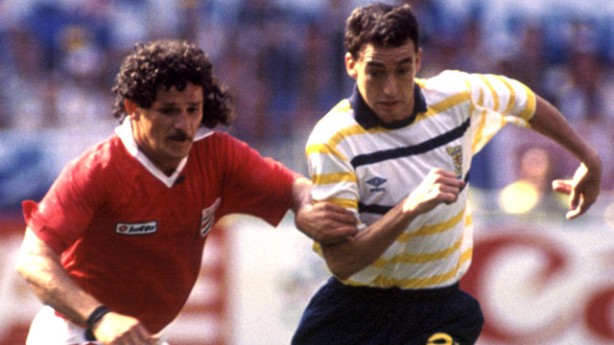
Escocia
‘Warning: Costa Rica Beatable’, The Scotsman laughed nervously in covering Wales’ friendly win. In spite of Costa Rica’s rank outsider status, the Scots had long had the hubris of 1978 burned from them by World Cup fiascos such as Iran, Peru, and failure to make it out of their group in four successive tournaments. No longer steered by the flights of fancy of an Ally MacLeod or the class of a Jock Stein, but by the dour, administrative pragmatism of Andy Roxburgh, they nevertheless possessed a strong squad. They’d outqualified the France of Cantona and Papin and could call on the gifts of Ally McCoist, Paul McStay and Gary McAllister among others. Costa Rica represented their best chance of a result, a wary paddle in the surf of Group C before the ominous waves of Brazil and Sweden loomed over them.
Back in Costa Rica, usually an oasis of peace in a turbulent region (it’s had no standing army since 1949), the football frenzy was its most dizzying. A national holiday was declared to allow children home from school and adults home from work to watch the nation’s biggest-ever football match 9,000 miles away.
Typically, Milutinovic had done his homework. Noting the lack of width in the Scotland side, he made his team compact, got men behind the ball in central areas and looked to frustrate and then break at pace.
Roxburgh had helped the Costa Rica cause by picking the struggling Alan McInally ahead of McCoist, but the biggest mistake his staff reportedly made was writing off one Luis Conejo. Their intelligence apparently had it that the 6ft3 goalkeeper was jittery and weak in the air. But Conejo, with a thick moustache that wouldn’t look out of place in an episode of Narcos, was a colossus who flung himself around like a lucha libre wrestler. ‘The rabbit’ wasn’t so much caught in the headlights as staring them out, and he almost absent-mindedly plucked every cross that came his way out of the air with a minimum of fuss. When a nervy start by Los Ticos saw the ball drop to Mo Johnston eight yards out, Conejo launched himself full length to push away a shot destined for the top left hand corner. He’d deny the Rangers striker in similar circumstances soon afterwards.
Emboldened by their goalkeeper’s exploits, Costa Rica settled into a rhythm, and the Scots, clad in their remarkable ‘sweetcorn hoops’, began to wilt. The underdogs passed the ball quickly and intelligently, and four minutes after half time they had their reward; some slick pass-and-move saw the ball worked into the tricky Claudio Jara inside the area, and the deftest of backheels completely flummoxed the Scottish defence, allowing the overlapping Juan Cayasso to latch on and clip the ball over Jim Leighton.
Almost instinctively, everyone watching knew that would be enough. The Central Americans were too organised, Scotland too moribund. When the final whistle went, Costa Rica couldn’t even swap shirts, as they hadn’t brought enough kit with them to give any away.
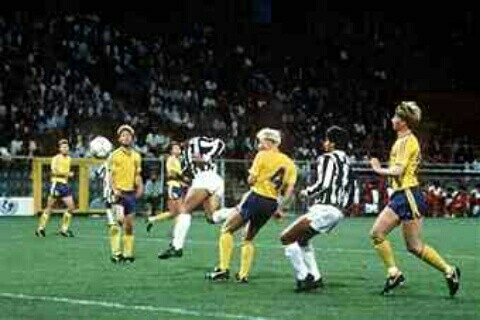
Brazil, Sweden and the World
The daunting prospect of Romario and Careca’s Brazil suggested a reality check awaited in Turin. Donning their change strip of black and white stripes, Los Ticos at least got the locals onside in the Delle Alpi, who adopted them as their own as they embarked on mission impossible. Sure enough, Brazil dominated, but Conejo, with what Brian Glanville termed his ‘gymnastic goalkeeping’, was equal to almost everything the Selecao could throw at him. It took a deflection off Flores’ elbow to deceive him just long enough for Muller’s shot to squeek in, but Conejo ensured what should have been a rout was a tight, single-goal affair.
All four teams could harbour hopes of making the last 16 going into the final round of group games. Despite losing both of their first two encounters, Sweden had been tipped as dark horses, with a number of the stars who’d finish third at USA ’94 emerging alongside stalwarts like Glenn Stromberg, all gruff beard and headband, like Hagar the Horrible’s hipster brother. Victory over Los Ticos might still put them through.
The piercingly blonde Johnny Ekstrom opened the scoring for the Scandinavians, pouncing on the rebound after a fierce free kick proved too hot for Conejo to hold on to. Like Scotland before them though, the Swedes, who needed more goals, had their confidence sapped by Costa Rica’s steadfastness, and with 15 minutes remaining Los Ticos won a free kick down their right. There to meet the ball as it was swung in was the dark, flowing mane of the formidable Flores, unmarked as he twisted to bounce a downward header away from Thomas Ravelli and inside the far post. Flores, a nation personified, took flight in delirium, his team mates struggling to get near him, just as had his markers had.
Milutinovic, cautious to a fault up to this point, now went for it, unleashing his secret weapon – the explosive pace and power of forward Hernan Medford. The speed and velocity of ‘El Pelicano’ completely unnerved the Swedish back line. In the 88th minute, Ravelli shanked a clearance into no man’s land and Medford was suddenly released, sprinting 40 yards unchallenged, drawing the ‘keeper out and then calmly slotting into the same corner Flores’ header had found.
A drunken fan in a Viking helmet stumbled onto the pitch to berate the shellshocked Swedish players, while the party started for the Costa Rican team and the revellers back home. At their maiden World Cup, one they weren’t even supposed to be at, they’d gone further on European soil than any CONCACAF nation before them.

Unlucky Rabbit’s Foot
A fearsome Czechoslovakia awaited in the last 16, and Milutinovic again sought to soothe the nerves of his charges, publicly talking up their chances while devoting hours of training sessions to practicing penalties. There was a problem, however…
Luis Conejo is a deeply religious man, and would take to the field every game clutching rosary beads and a statue of the Madonna of the Angels. But now the prayers of ‘the rabbit’ went unanswered. A nasty kick to the ankle he’d received against Sweden reduced him to hobbling around on crutches, unable to train. He was given numerous injections, but the ankle just wasn’t receptive, and it became clear he wouldn’t recover in time. Costa Rica would have to do without their talisman. His replacement Hermidio Barrantes was, as Glanville would record, ‘no Conejo’.
Without their giant custodian to organise them, Los Ticos looked a lot more vulnerable against the powerful Czechs. And where Conejo’s great strength had been in commanding his area, Barrantes could not have been more terrified of the high ball if it had mutated teeth and tried to take a bite out of him every time a cross came in. The opening goal after 12 minutes set the tone; a deep ball to the back stick was greeted by the considerable forehead of Thomas Skuhravy, who held off his marker to deliver his signature move. Barrantes remained affixed to his line, paralysed in horror at the bemulleted locomotive steaming towards him.
There was still time for one last twist in the fairytale. 10 minutes after half time, Costa Rica again won a free kick in a dangerous area wide on the right, and this time, the one to meet the delivery was the youngest player in the entire tournament, Ronald Gonzalez Brenes. The 19-year-old got hangtime on his vertical leap, reminiscent of a pez dispenser, to smash in an authoritative header of his own. Suddenly, they were another goal and half an hour away from the last eight.
Sadly it was not to be, and within another 10 minutes things fell apart completely. Skuhravy, who would finish second only to Toto Schillachi in the hunt for the golden boot, added two more elementary goals to complete a headed hat trick, Barrantes inexplicably staying at home for the cross on each occasion. Sandwiched in between came a thunderous 30-yard free kick from specialist Lubos Kubik, but even then, Barrantes’ feet of clay were evident, his positioning giving the midfielder an awful lot to aim at.
A 4-1 thumping was a sad end to an incredible journey, but the Costa Rican effort ensured they left the field bathed in the cheers of all sides of Bari’s Stadio San Nicola Stadium and saluted by their vanquishers.

The Way Back
Though there was initial concern about the reception back home when Barrantes received death threats (an armoured car was ready to whisk him away from the airport should it prove necessary), the players’ return was a rapturous one. Flores recalls hundreds of people coming out of their homes with mirrors to greet the plane, turning them upwards as it came in to land so that the squad looked out of the window to see a bright, shimmering light welcoming them home wherever they looked.
Inevitably it would only be a slight return for many of the squad, who would leave to try their luck in Europe. Medford and Gonzalez Brenes would join the Dinamo Zagreb of Boban and Sukur. Scot-slayer Cayasso headed to the Bundesliga with Stuttgart Kickers.
Predictably, the most successful export was Conejo. Voted into France Football’s Team of the Tournament, he did not want for offers, but claimed to have been “tricked by his agent” into turning down Serie A Torino in favour of little Albacete. The La Mancha outfit had only just been promoted to the Spanish Segunda division, but Conejo helped engineer another fairytale, as they were promoted to La Liga for their first time in their history, finishing seventh in the Spanish top tier the following season. His legacy for the marvellously nicknamed ‘Clockwork Cheese’ and for his country has endured, not least through the impressive conveyor belt of goalkeeping talent he has supplied both with in the years since retirement. As the national team’s goalkeeping coach, he has developed the likes of Keylor Navas and Daniel Carvajal, while facilitating moves to Albacete for each.
As for Bora, ever the enigma, he slipped away after the tournament to work on his next miracle – trying to give the Americans a team worth caring about before their own World Cup.
While Navas and the class of Brazil 2014, who came within a penalty shoot out of the semi-finals, have eclipsed their efforts, the 1990 vintage has a special place in the country’s national consciousness. Films have been made about their story, and their impact has reached further than football: “It is a point of identification for all Costa Ricans, even for those who were not born then or for those who do not enjoy football,” believes Al Dia Editor Antonio Alfaro. “It goes beyond eleven guys kicking the ball […] is national pride, like the heroic battles that are often included in history books.”
It’s still probably a bad idea to go for a kickaround on Isla Nublar though.
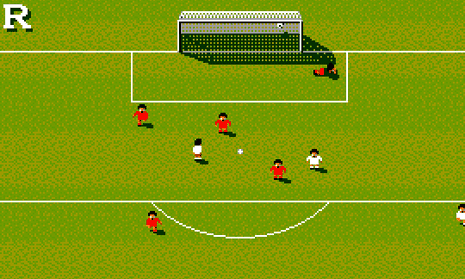
[…] Those hopes were fostered further when their play-off opponents were revealed. Iran had some quality in their ranks, not least the effective little and large strike combo of future record international goalscorer Ali Daei and reigning Asian Player of the Year Khodadad Azizi. Yet they had spectacularly blown automatic qualification, losing their last three games to fall from first to third in the Asian section, then losing to Japan in the play-off for the remaining automatic place in France. The play-off with Australia was their last chance, and they appeared to be spiraling into it in disarray, even replacing their manager shortly before the game with the fairly unheralded Valdeir Vieira – who had himself been binned by Costa Rica on the eve of Italia ’90. […]
[…] finally put soccer on the American sporting agenda. Attempts to find a high-profile successor to perennial miracle worker Bora Milutinovic might have foundered (Carlos Quiroz and World Cup winner Carlos Alberto Parreira […]